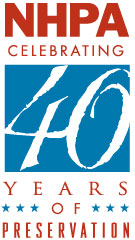Public Input Sought on "Preserve America" Proposal
 From National Coalition for History:
From National Coalition for History:Mrs. Laura Bush, the President's wife and Honorary Chair of the "Preserve America Program" (a White House initiative that encourages and supports community efforts to preserve and enjoy the nation's cultural and natural heritage), has announced that, in cooperation with the Advisory Council on Historic Preservation (ACHP), she will lead a national "Preserve America Summit" in October 2006 to mark the 40th anniversary of the passage of
the National Historic Preservation Act of 1966.
As part of that effort, a panel of experts representing historic preservation, education, history, and related fields, has been appointed to review the major components of the national historic preservation program in advance of the summit. The panel, which met in Detroit, Michigan, on 8 August, is beginning to consider how best to build a preservation ethic and public appreciation of history; it is charged to make recommendations designed to improve the nation's historical preservation policy and programs.
Among those appointed to the panel are Heather MacIntosh, President of Preservation Action; James G. Basker, President of the Gilder Lehrman Institute of American History; Spencer Crew, Executive Director and CEO of the National Underground Railroad and Freedom Center; and Libby O'Connell, Senior Vice President/Chief Historian of The History Channel and about a dozen others. While the historic preservation, museum, and public history communities are well represented on the panel, substantive representation from the archival community is noticeably absent, and there is no representation whatsoever from the higher-education academic history community.
Nevertheless, the panel is seeking public responses (academics are welcome to respond) to the following questions: "How can the significance and value of our authentic heritage resources and appreciation for the importance of knowing and understanding history be more broadly integrated into our national consciousness? The panel also wants to know, " is the present situation in regard to historic preservation and broad public appreciation of the importance of history education already sufficient in America?"
E-mail comments should be sent here.
Index Keywords: historic-preservation; cultural-heritage-tourism



0 Comments:
Post a Comment
<< Home